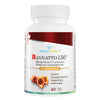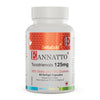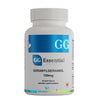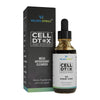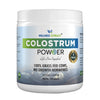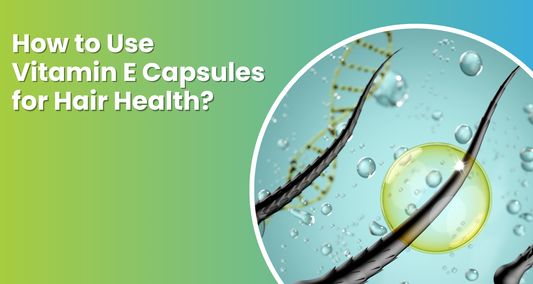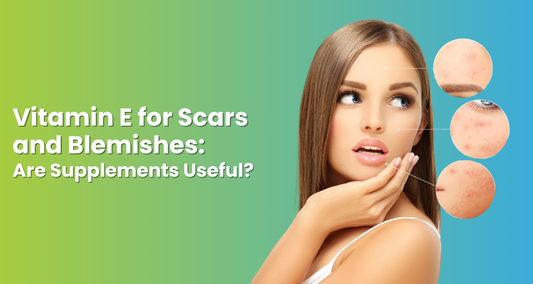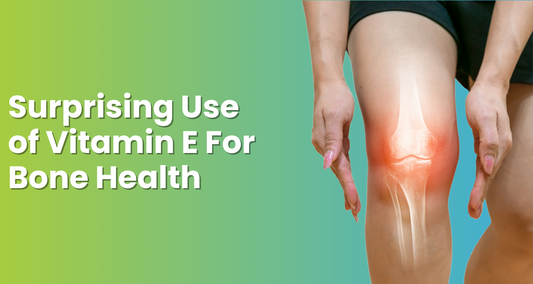From reducing oxidative stress to nourishing hair follicles, Vitamin E capsules promise a plethora of benefits that could transform your hair care routine. Whether you’re battling dryness, looking to boost hair growth, or simply aiming to add a glossy sheen to your mane, Vitamin E might just be the secret weapon you’ve been searching for.
Keep reading to learn how adding Vitamin E capsules for hair health could be a game-changer for your locks.
What is Vitamin E?

Vitamin E is a group of eight fat-soluble compounds that include four tocopherols and four tocotrienols. Vitamin E is essential for maintaining healthy skin and eyes and plays a crucial role in the body’s immune function. Among its various forms, tocotrienols are particularly significant due to their potent antioxidant properties.
Natural plant-based sources of tocotrienols include Rice, Palm, and Annatto. Annatto is the only Tocopherol-free natural source, containing 90% Delta and 10% Gamma Tocotrienols, making it a unique and highly potent source of Vitamin E.
Compared to tocopherols, the smaller molecular structure of Tocotrienols Vitamin E allows them to move faster and cover nearly 50 times more cellular area, providing extensive protection to more cells. This structural difference enables tocotrienols to penetrate into cells more efficiently, making them a superior form of Vitamin E for protecting against oxidative damage.
What Causes Hair Damage?

Hair loss and hair damage can stem from various causes. Usually, losing 50-100 hairs daily is expected, with new ones growing in their place. However, abnormal hair loss might be due to aging, medication side effects, illnesses, stress, scalp fungus, hair dye, and hereditary baldness.
Similarly, issues such as thin, brittle, dull, or flat hair can arise from environmental factors, including UV radiation and pollution, affecting hair health.
While these symptoms are visible externally, the root cause often lies within the hair and scalp cells. Collagen, a protein vital for maintaining healthy and robust hair, can be compromised by oxidative stress, weakening hair and scalp cells at a cellular level. This is where Vitamin E Capsules for Hair Health play a crucial role. They help combat oxidative stress, supporting the strength and vitality of hair from the inside out.
Incorporating Tocotrienols Vitamin E into your diet may provide the necessary nutrients to support hair and scalp cell health, offering a more comprehensive approach to tackling hair loss and damage.
Why Your Hair Loves Vitamin E
Picture your hair as a garden; just as blossoms require the right blend of nutrients to flourish, so does your hair crave vitamin E for its unparalleled nourishment. This nutrient acts as a catalyst, invigorating hair growth by fostering a fertile soil in which your hair can root and expand.
With its mighty antioxidative capabilities, vitamin E swoops in as a hero, battling the environmental stressors and toxins that threaten to weaken your hair's integrity and shine: a protective embrace around each strand.
|
Reason |
Why Vitamin E for Hairs |
|
Antioxidative Shield |
Protects hair from environmental damage and stress |
|
Growth Stimulant |
Encourages healthy hair growth by nurturing the scalp |
|
Nourishment |
Delivers essential nutrients for hair strength and shine |
Reasons to Choose Tocotrienol Vitamin E Capsules for Hair Health
Tocotrienols’ antioxidant properties may help combat oxidative stress, a culprit behind hair and scalp issues. By maintaining the integrity of the skin barrier on the scalp, this nutrient helps support a moisturized, irritation-free environment conducive to hair growth. Here are some convincing reasons to add Tocotrienol Vitamin E to your diet routine –
- Could Help Support a Healthy Scalp

Maintaining the scalp’s health is pivotal, and Tocotrienols Vitamin E capsules play a significant role. The nutrient’s antioxidant effects combat oxidative stress that leads to cell damage on the scalp and preserve the skin’s natural barrier, reducing dryness and irritation that can inhibit hair growth.
Regular intake of Vitamin E may foster an environment that nurtures stronger, healthier hair roots. This practice soothes the scalp, mitigates inflammation—often a precursor to conditions like dandruff or dermatitis—and encourages the sebaceous glands to produce oils balanced, ensuring the scalp remains well-moisturized and free from discomfort.
- May Help Prevent Hair Loss
Tocotrienols Vitamin E’s role in preventing hair loss emerges from its capacity to enhance blood circulation to the scalp. Improved blood flow ensures that hair follicles receive a rich supply of oxygen and nutrients, which are crucial for maintaining healthy hair growth and preventing hair thinning and loss.
Additionally, the potent antioxidant properties of Tocotrienols aid in reducing the cellular stress linked to hair loss. These properties help protect hair follicles from damage caused by free radicals, thereby supporting hair retention and reducing the likelihood of conditions like pattern hair loss and alopecia areata.
- Increased Hair Shine

One remarkable attribute of Tocotrienol Vitamin E for hair is its ability to impart a radiant shine, transforming dull and lifeless strands into lustrous locks. This shine comes from the nutrient’s ability to seal in moisture, ensuring that each hair shaft reflects light more effectively.
The Vitamin E intake may help smooth the hair’s outer layer, known as the cuticle. This smoothing action reduces frizz and enhances the hair’s natural glossiness, making it look healthier and more vibrant.
- Strong Antioxidant Support
Tocotrienols Vitamin E exhibit potent antioxidant characteristics. These properties are pivotal in safeguarding hair follicles against oxidative stress triggered by free radicals. By virtue of this shielding effect, Tocotrienols can play a crucial role in upholding the overall health of the scalp and hair follicles, thereby fostering an environment conducive to robust and lustrous hair growth.
This antioxidant prowess serves as a vital defense mechanism, countering the detrimental effects of environmental aggressors and oxidative damage on hair health. Through the fortification of the scalp's natural defenses, Tocotrienols Vitamin E contributes to the preservation of hair follicle integrity, potentially averting conditions such as hair thinning and breakage.
Consequently, the sustained protection afforded by Tocotrienols Vitamin E ensures the maintenance of optimal scalp health, which is fundamental for the sustained growth and vitality of hair strands.
- Anti-inflammatory properties
When considering the benefits of Vitamin E capsules for hair health, it's essential to understand their multifaceted effects, particularly their anti-inflammatory properties. Tocotrienols have demonstrated remarkable anti-inflammatory effects. Inflammation of the scalp is a common precursor to various hair issues, including hair loss and scalp conditions such as dandruff and dermatitis.
By mitigating inflammation, tocotrienols Vitamin E capsules play a pivotal role in nurturing a harmonious scalp environment, fostering conditions ideal for robust hair growth and overall scalp health optimization.
This anti-inflammatory action extends beyond mere symptom alleviation; it addresses underlying factors contributing to scalp distress, thereby offering comprehensive support for hair vitality and resilience. Through the attenuation of inflammatory processes, tocotrienols Vitamin E capsules provide a holistic approach to hair care, promoting sustained follicular health and mitigating the risk of hair thinning or loss.
- Moisturizes and Conditions Hair

Tocotrienols possess inherent properties that enable them to effectively hydrate and nourish the hair strands, imparting a soft and supple texture. By locking in moisture, Tocotrienols Vitamin E may contribute to the maintenance of optimal hair hydration levels, thereby safeguarding against dryness and brittleness.
This moisture-retaining capacity not only enhances the overall appearance and feel of the hair but also serves as a protective barrier against environmental stressors that can lead to damage and breakage. By fortifying the hair's natural moisture barrier, Tocotrienols may play a crucial role in minimizing the risk of split ends and breakage, thereby promoting the retention of hair length and vitality.
Furthermore, the conditioning properties of Vitamin E ensure that the hair remains manageable and resilient, facilitating easier styling and reducing the likelihood of tangles and knots. Adding Vitamin E into a hair care regimen can thus contribute to the maintenance of healthy, lustrous locks that exude vitality and shine.
- Promotes Hair Growth
When exploring the advantages of Vitamin E capsules for hair health, it's crucial to delve into their potential to promote hair growth, particularly through the action of tocotrienols.
Emerging research indicates that tocotrienols may exert stimulatory effects on hair follicles and enhance the synthesis of key proteins vital for hair growth. By bolstering follicular activity and augmenting the production of essential hair proteins, tocotrienols Vitamin E capsules facilitate the development of thicker, stronger hair strands.
This fortification not only enhances the structural integrity of the hair but also contributes to a reduction in hair thinning and loss, thereby fostering a denser and more voluminous mane.
- May Protect Against UV Damage

When considering the benefits of Vitamin E capsules for hair health, it's essential to acknowledge their potential role in protecting against UV damage, particularly through the action of tocotrienols.
Tocotrienols exhibit properties that may shield the hair from the harmful effects of UV radiation. Prolonged exposure to UV rays can compromise the structural integrity of hair strands, resulting in weakened hair prone to breakage and damage.
By forming a protective barrier, tocotrienols may help mitigate the adverse impact of UV radiation, thereby preserving the strength and integrity of the hair. This shielding effect extends beyond mere surface protection; it addresses underlying factors that contribute to hair damage and deterioration caused by UV exposure.
How to Use Tocotrienols Vitamin E for Hair Health?
Turning attention to how one might amplify one’s hair’s health through Vitamin E, several ways emerge, each catering to different preferences and routines. For those looking to nourish their bodies from the inside out, improving your diet with foods rich in Vitamin E or opting for dietary supplements can elevate your hair health game.
Additionally, directly applying Vitamin E oils to the scalp or hair brings a focused approach to harnessing this vitamin’s benefits. Each strategy offers a unique pathway to bolstering your hair’s strength, shine, and overall health. Let’s understand –
- Tocotrienols Vitamin E Supplement
Tocotrienol Vitamin E supplements offer a straightforward route for those seeking to enhance their hair health from the inside. Taking Vitamin E capsules for hair health ensures a precise dose of this essential nutrient, directly promoting a healthy scalp and reducing oxidative stress.
Consultation with a healthcare practitioner before starting any new dietary supplement is essential to tailor the intake to your health needs and conditions. This ensures that the Vitamin E supplementation strategy supports hair growth and scalp health.
- Vitamin E Oils
Vitamin E oils can be a powerful tool for enhancing hair health, offering a concentrated form of this vital nutrient directly to the scalp and hair. The topical application of these oils not only soothes and moisturizes the scalp but also aids in repairing and strengthening hair follicles, diminishing the risk of hair loss and encouraging fuller, more robust hair growth.
By choosing high-quality Tocotrienols Vitamin E oils, you can maximize the absorption of this antioxidant-rich nutrient, ensuring that the scalp and hair benefit from its protective and restorative properties.
Other Ways to Promote Hair Health
In this section, we’ll learn the diverse array of strategies and practices that can complement the benefits of Vitamin E capsules, ensuring that your hair receives the comprehensive care it deserves:
- Follow a Balanced Diet for Healthy Hair

A balanced diet plays a crucial role in maintaining healthy hair. Nutrients such as protein, vitamins (including Vitamin E), minerals, and essential fatty acids are essential for hair growth and strength. Incorporating a variety of foods such as lean proteins, fruits, vegetables, whole grains, and healthy fats into your diet ensures that your hair receives the necessary nutrients for optimal health. Additionally, staying hydrated by drinking plenty of water is important for keeping hair hydrated and promoting overall health.
- Lifestyle Factors - Stress Management, Adequate Sleep, etc.
Lifestyle factors can significantly impact the health of your hair. Chronic stress can disrupt the hair growth cycle and lead to hair loss or thinning.
Practicing stress-management techniques such as meditation, yoga, or deep breathing exercises can help reduce stress levels and promote healthier hair growth. Adequate sleep is also crucial for overall health, including hair health. Aim for 7-9 hours of sleep each night to support optimal hair growth and repair.
- Hair Care Practices to Complement Vitamin E Supplementation (Gentle Styling, Proper Washing Techniques, etc.)
In addition to incorporating Vitamin E supplementation into your routine, adopting proper hair care practices is essential for maintaining healthy hair. Opt for gentle styling techniques to minimize damage to the hair shaft, such as using heat protectants before using styling tools and avoiding tight hairstyles that pull on the hair follicles. When washing your hair, use a mild shampoo and conditioner suited for your hair type, and avoid over-washing, which can strip the hair of its natural oils.
Furthermore, regular trimming of split ends helps prevent breakage and promotes healthier-looking hair. Deep conditioning treatments can also help nourish and strengthen the hair, especially when combined with Vitamin E capsules or oil.
Furthermore, protecting your hair from environmental damage, such as UV rays and pollution, by wearing hats or using protective hair products can help maintain its health and vitality.
Vitamin E Dosage Recommendations for Hair Health

Determining the appropriate dosage of Vitamin E for promoting hair health depends on various factors, including age, gender, overall health status, and any underlying medical conditions. While there is no one-size-fits-all recommendation, several guidelines can help individuals incorporate Vitamin E into their daily routine effectively.
- Recommended Dietary Allowance (RDA): The National Institute of Health (NIH) suggests an RDA of 15 milligrams (or 22.4 IU) of Vitamin E per day for adults. This RDA is based on the amount required to maintain overall health and prevent deficiency symptoms.
- Consultation with a Healthcare Professional: It's essential to consult with a healthcare provider, such as a physician or registered dietitian, before starting any new supplement regimen, including Vitamin E for hair health. They can assess your individual needs, consider any existing health conditions or medications, and provide personalized recommendations.
- Consideration of Additional Factors: Factors such as existing dietary intake of Vitamin E, lifestyle habits, and specific hair concerns (such as hair loss or brittleness) should also be taken into account when determining dosage.
- Monitoring and Adjustment: Regular monitoring of hair health and overall well-being can help determine the effectiveness of Vitamin E supplementation. If you experience any adverse effects or concerns, it's essential to adjust the dosage or seek guidance from a healthcare professional.
Types of Vitamin E Supplements Available: Tocopherol vs. Tocotrienols
When it comes to Vitamin E supplementation, two primary forms are commonly available: tocopherols and tocotrienols. While both tocopherols and tocotrienols offer potential benefits for overall health, emerging research suggests that tocotrienols may possess unique advantages over tocopherols, particularly concerning their impact on hair health and beyond.
Let's explore the differences between these two forms of Vitamin E and why tocotrienols are increasingly gaining recognition as the superior choice:
Tocopherols:
- Tocopherols are the most well-known and widely used form of Vitamin E supplements.
- They are commonly found in various foods and traditional Vitamin E supplements.
- Tocopherols are known for their antioxidant properties, which help neutralize free radicals and protect cells from oxidative damage.
- While tocopherols offer numerous health benefits, including supporting immune function and cardiovascular health, their effectiveness in promoting hair health may be limited compared to tocotrienols.
Tocotrienols:
- Tocotrienols are a lesser-known form of Vitamin E, often overshadowed by tocopherols, but they are gaining attention for their unique biological properties.
- Unlike tocopherols, tocotrienols have an unsaturated side chain, which allows them to penetrate cell membranes more effectively.
- Research suggests that tocotrienols may possess superior antioxidant and anti-inflammatory properties compared to tocopherols, potentially more effective in combating oxidative stress and inflammation associated with hair loss and other health conditions.
- Studies have shown promising results regarding the role of tocotrienols in promoting hair growth, improving hair thickness, and reducing hair loss. Tocotrienols may support hair follicle health by enhancing blood circulation to the scalp, stimulating hair follicle proliferation, and reducing oxidative damage to hair follicles.
- Additionally, tocotrienols have been linked to various other health benefits, including cardiovascular health, brain health, and skin health.
Are there any risks or side effects?

Vitamin E capsules for hair health boast many benefits, from promoting a healthier scalp to providing vital nutrients that strengthen hair. However, it’s essential to approach their use with an awareness of potential risks and side effects:
- Individual responses can vary, and what works for one might not suit another, emphasizing the need for careful consideration and, at times, professional advice.
- Overuse of Vitamin E, particularly in capsule form, can lead to specific side effects such as scalp irritation.
- Individuals with sensitive skin may experience discomfort or even allergic reactions, underscoring the importance of starting with a lower dose or performing a patch test to gauge tolerance. This minimizes the risk of adverse reactions and ensures a positive experience with Vitamin E capsules for hair.
- While Vitamin E is generally considered safe, taking it in high doses may interfere with absorbing other fat-soluble vitamins, such as Vitamin K, which could pose health risks.
- Individuals on medication or with health conditions impacting Vitamin E metabolism should consult a physician before adding Vitamin E capsules to their hair care routine. A healthcare professional can offer specific guidance, ensuring safe and effective supplementation as part of a comprehensive health plan.
Moreover, the quality and brand of Tocotrienol Vitamin E capsules can greatly influence their efficacy and safety. Not all products are created equal; some may contain filler ingredients that detract from the benefits or increase the likelihood of side effects. Opting for reputable, transparent brands that prioritize purity and sustainability can help users reap the full benefits of Vitamin E for hair health while safeguarding against potential risks.
Conclusion

Unlocking the benefits of Vitamin E capsules for hair health offers a multifaceted approach to nurturing a healthy scalp, reducing hair loss, and enhancing hair’s natural shine. Vitamin E’s antioxidant properties combat oxidative stress and support the scalp’s moisture and integrity, fostering an environment for robust and healthy hair growth.
Whether through shampoos, dietary improvements, supplements, or direct application of oils, incorporating Tocotrienols Vitamin E into your hair care routine can significantly boost hair strength, shine, and overall health.
However, users should be mindful of potential risks and consult a physician to ensure these supplements enhance hair health without adverse effects. Choosing high-quality Vitamin E products is crucial for maximizing benefits and minimizing risks, marking an important step toward achieving optimal hair health.
Vitamin E capsules for Hair Health - Frequently Asked Questions (FAQs)
Question: Are vitamin E capsules good for hair?
The use of vitamin E capsules for hair care has gained popularity due to its nourishing and protective properties. When applied topically or ingested orally, vitamin E promotes blood circulation to the scalp, which helps stimulate hair follicles and encourage new growth.
Question: Which vitamin is good for hair growth and thickness?
Tocotrienols Vitamin E is excellent for hair growth and thickness as it promotes scalp health, improves blood circulation, and nourishes hair follicles, leading to stronger and thicker hair.
Question: Are Vitamin E capsules good for hair?
Yes, Vitamin E capsules are good for hair. They help nourish the scalp, strengthen hair follicles, and promote healthy hair growth.
Question: Can I apply a Vitamin E capsule on my hair?
Yes, you can apply a Vitamin E capsule directly on your hair. Simply puncture the capsule and apply the oil to your scalp and hair, then leave it on for a few hours or overnight before washing it off.
Question: Can I eat Vitamin E capsules for hair?
Yes, consuming capsules orally can also benefit hair health, as it supports overall scalp and hair health from within. However, make sure to consult your healthcare provider before starting any new supplementation.
Question: Can Vitamin E capsules grow hair?
Vitamin E capsules may promote hair growth by nourishing the scalp, improving blood circulation, and strengthening hair follicles, which may result in healthier and faster hair growth.
